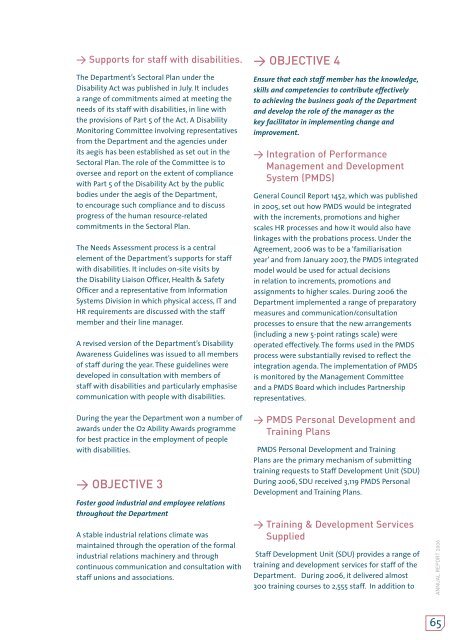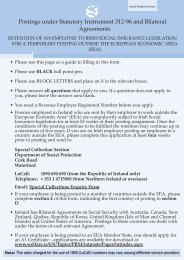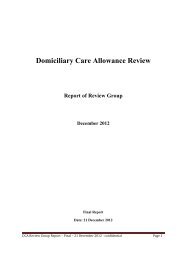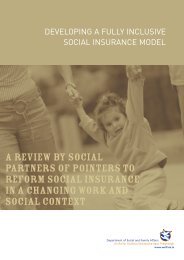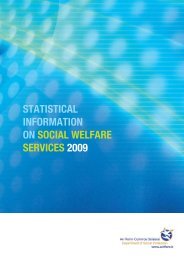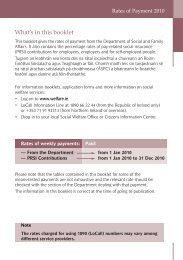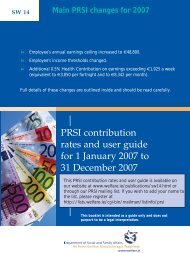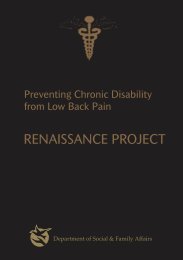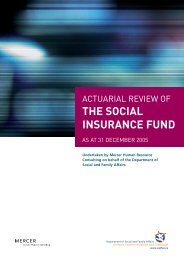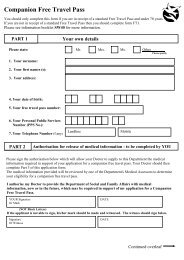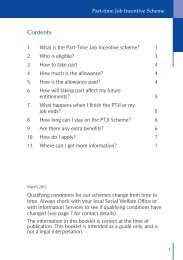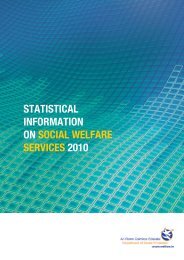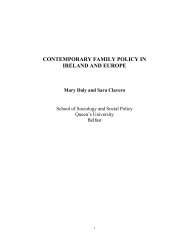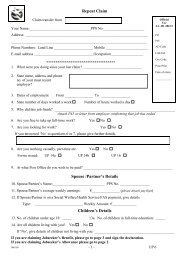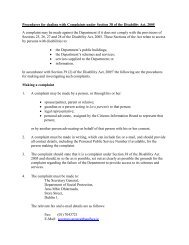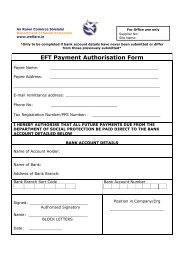department of social and family affairs annual report 2006 - Welfare.ie
department of social and family affairs annual report 2006 - Welfare.ie
department of social and family affairs annual report 2006 - Welfare.ie
You also want an ePaper? Increase the reach of your titles
YUMPU automatically turns print PDFs into web optimized ePapers that Google loves.
Supports for staff with disabilit<strong>ie</strong>s.<br />
The Department’s Sectoral Plan under the<br />
Disability Act was published in July. It includes<br />
a range <strong>of</strong> commitments aimed at meeting the<br />
needs <strong>of</strong> its staff with disabilit<strong>ie</strong>s, in line with<br />
the provisions <strong>of</strong> Part 5 <strong>of</strong> the Act. A Disability<br />
Monitoring Committee involving representatives<br />
from the Department <strong>and</strong> the agenc<strong>ie</strong>s under<br />
its aegis has been established as set out in the<br />
Sectoral Plan. The role <strong>of</strong> the Committee is to<br />
oversee <strong>and</strong> <strong>report</strong> on the extent <strong>of</strong> compliance<br />
with Part 5 <strong>of</strong> the Disability Act by the public<br />
bod<strong>ie</strong>s under the aegis <strong>of</strong> the Department,<br />
to encourage such compliance <strong>and</strong> to discuss<br />
progress <strong>of</strong> the human resource-related<br />
commitments in the Sectoral Plan.<br />
The Needs Assessment process is a central<br />
element <strong>of</strong> the Department’s supports for staff<br />
with disabilit<strong>ie</strong>s. It includes on-site visits by<br />
the Disability Liaison Officer, Health & Safety<br />
Officer <strong>and</strong> a representative from Information<br />
Systems Division in which physical access, IT <strong>and</strong><br />
HR requirements are discussed with the staff<br />
member <strong>and</strong> their line manager.<br />
A revised version <strong>of</strong> the Department’s Disability<br />
Awareness Guidelines was issued to all members<br />
<strong>of</strong> staff during the year. These guidelines were<br />
developed in consultation with members <strong>of</strong><br />
staff with disabilit<strong>ie</strong>s <strong>and</strong> particularly emphasise<br />
communication with people with disabilit<strong>ie</strong>s.<br />
During the year the Department won a number <strong>of</strong><br />
awards under the O2 Ability Awards programme<br />
for best practice in the employment <strong>of</strong> people<br />
with disabilit<strong>ie</strong>s.<br />
> OBJECTIVE 3<br />
Foster good industrial <strong>and</strong> employee relations<br />
throughout the Department<br />
A stable industrial relations climate was<br />
maintained through the operation <strong>of</strong> the formal<br />
industrial relations machinery <strong>and</strong> through<br />
continuous communication <strong>and</strong> consultation with<br />
staff unions <strong>and</strong> associations.<br />
> OBJECTIVE 4<br />
Ensure that each staff member has the knowledge,<br />
skills <strong>and</strong> competenc<strong>ie</strong>s to contribute effectively<br />
to ach<strong>ie</strong>ving the business goals <strong>of</strong> the Department<br />
<strong>and</strong> develop the role <strong>of</strong> the manager as the<br />
key facilitator in implementing change <strong>and</strong><br />
improvement.<br />
> Integration <strong>of</strong> Performance<br />
Management <strong>and</strong> Development<br />
System (PMDS)<br />
General Council Report 1452, which was published<br />
in 2005, set out how PMDS would be integrated<br />
with the increments, promotions <strong>and</strong> higher<br />
scales HR processes <strong>and</strong> how it would also have<br />
linkages with the probations process. Under the<br />
Agreement, <strong>2006</strong> was to be a ‘familiarisation<br />
year’ <strong>and</strong> from January 2007, the PMDS integrated<br />
model would be used for actual decisions<br />
in relation to increments, promotions <strong>and</strong><br />
assignments to higher scales. During <strong>2006</strong> the<br />
Department implemented a range <strong>of</strong> preparatory<br />
measures <strong>and</strong> communication/consultation<br />
processes to ensure that the new arrangements<br />
(including a new 5‐point ratings scale) were<br />
operated effectively. The forms used in the PMDS<br />
process were substantially revised to reflect the<br />
integration agenda. The implementation <strong>of</strong> PMDS<br />
is monitored by the Management Committee<br />
<strong>and</strong> a PMDS Board which includes Partnership<br />
representatives.<br />
> PMDS Personal Development <strong>and</strong><br />
Training Plans<br />
PMDS Personal Development <strong>and</strong> Training<br />
Plans are the primary mechanism <strong>of</strong> submitting<br />
training requests to Staff Development Unit (SDU)<br />
During <strong>2006</strong>, SDU received 3,119 PMDS Personal<br />
Development <strong>and</strong> Training Plans.<br />
> Training & Development Services<br />
Suppl<strong>ie</strong>d<br />
Staff Development Unit (SDU) provides a range <strong>of</strong><br />
training <strong>and</strong> development services for staff <strong>of</strong> the<br />
Department. During <strong>2006</strong>, it delivered almost<br />
300 training courses to 2,555 staff. In addition to<br />
<strong>annual</strong> <strong>report</strong> <strong>2006</strong><br />
65


